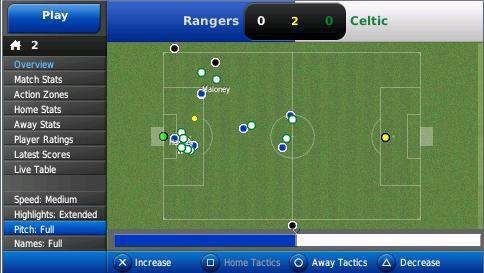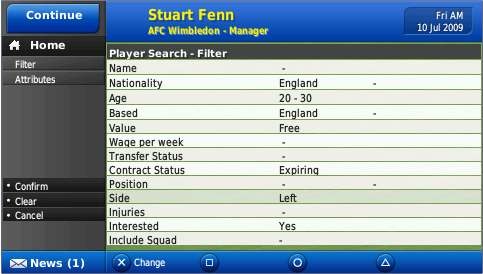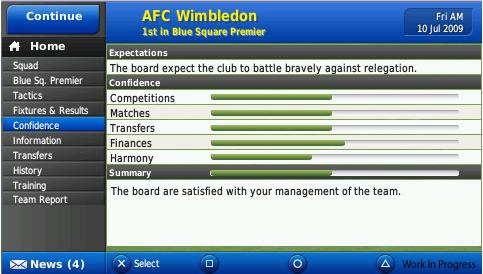Managing a professional soccer team is arguably one of the most stressful jobs in sport, but if you've ever played one of developer Sports Interactive's management sims, then you know that it can also be a lot of fun. Poring over spreadsheets and experiencing matches primarily via text-based commentary have long been favorite pastimes for fans of the Football Manager games, and the series' only major weakness is that as it has become increasingly deep with every incarnation, it has also become increasingly intimidating for newcomers. The scaled-down Football Manager Handheld 2010 doesn't have that problem, but sadly, it has a number of others and is a little too simplistic to keep veterans entertained for long.

Your experience with Football Manager Handheld 2010 will vary wildly depending on which team from the 11 predominantly European playable countries (Australia and Brazil are the only exceptions) you choose to manage. If you choose a top-flight English Premiership team like Chelsea, for example, you start your career armed with a checkbook that you could start a space program with. If you opt for a smaller, semiprofessional side struggling in the English Conference divisions, though, your budget for the entire season might be less than a Chelsea player earns in 90 minutes. The flipside is that with great power comes great responsibility: Teams like Chelsea expect to have some silverware to show for their spending at the end of a season, while smaller clubs might be satisfied with survival and positively excited by the prospect of mid-table obscurity. Regardless of which team you start your career with, your day-to-day responsibilities are the same, and there's as much fun to be had (as well as many niggling problems to be found) in between matches as during them.
Matches play out much as they always have in Football Manager games, with text colored to match the teams involved flashing up on the screen to deliver something resembling commentary. There's no option to get the play-by-play for every kick of the ball, but the extended highlights option at least fills you in on anything pertinent. The problem is that, as you read the commentary and watch the match with your mind's eye, you're frequently forced to reset the action as you realize that what you're being told doesn't always make sense. A player who has just made a darting run down the right flank with the ball shouldn't arrive alongside his own area, for example. When your team strings together some positive-sounding passes and is presumably moving up the field, it can also be jarring to read-- without any warning--that the move ended with your keeper having to make a spectacular save. This problem may well be the result of multiple highlights playing back-to-back without any discernible break, but regardless of the reasons, the result is disorienting. There's an option to have select highlights automatically play out on a 2D pitch with colored circles representing the players, but it doesn't run smoothly, and because it rarely kicks in for anything but shots at goal, the split second it takes to load serves as a spoiler that something's about to happen.

Match days, which are surprisingly engaging given the way they're presented, are further hindered by your relative lack of involvement in them. As the manager, you've obviously picked your formation and your team ahead of time. There are also some instructions you can give, such as how hard your players will go into tackles and whether they play with an offensive or defensive mentality, but for many of the 90 minutes after every kickoff, you can feel quite helpless. Managers undoubtedly feel that way in real life sometimes, but there's no way to feel like you're shouting from the sidelines in Football Manager Handheld 2010. Furthermore, while the instructions you can give on the fly definitely have an effect, you're not always presented with great information on which to base those decisions.
That's also true when you're trying to work the transfer market, which is undoubtedly one of the more interesting places to spend your time in between matches. Buying, selling, or loaning players is one of the most obvious ways that you can change and hopefully improve your squad, but the scouts whose job it is to assist you in this area sometimes say very different things, depending on which screen you read their reports on. Immediately after reporting that you should attempt to sign a player at all costs, a scout might tell you that he doesn't believe the same player is good enough to succeed at your club, for example. Or, after bringing a potential transfer target to your attention because he's "twice the player" of the guy you currently have in that position, you're told on the next screen that your current player is better but that the target "isn't far from that standard." When sent out on searches, scouts will also frequently bring players to your attention simply to point out that they're not good enough for your team, which is just a waste of everybody's time. This makes scouring the marketplace for players single-handedly a far more reliable way to go about things, even if the occasionally unwieldy menu system does make it time consuming.

Unfortunately, the problems with the feedback that you're given aren't limited to nonsensical scouts. Your assistant manager and some of your rival teams can be equally random at times. When a player attracted unwanted media attention by complaining that he wasn't getting first-team football, for example, our assistant's advice was to rest him for a few games. And just a couple of weeks after signing a young goalkeeper on a free transfer, a scout from a team in a higher division was reportedly so impressed with his performance during a match in which he didn't actually play that we were compelled to accept a club-record-breaking transfer fee for him. Odd occurrences like these are just common and noticeable enough that they detract from the experience, but even alongside the match day shortcomings they're not enough to prevent Football Manager Handheld 2010 from sucking you in for a time.
Despite some failures of feedback and logic, there's something compelling about taking charge of a soccer team and experiencing the same dramatic highs and lows that real managers do. Your scouts might not be as helpful as they should be when you're contemplating the purchase of a promising 16-year-old player, but that doesn't make it any less satisfying to see that youngster blossom into one of your team's stars or, failing that, sell for millions to a team in a higher division. Similarly, regardless of how much you feel your decisions affected the outcome, it's great to see your team win a crucial game. If you're looking for an easy way to get into the Football Manager series, this pocket-sized version is a decent place to start. If you're a veteran of the virtual touchlines, though, Football Manager Handheld 2010 is unlikely to keep you interested beyond your first few seasons.